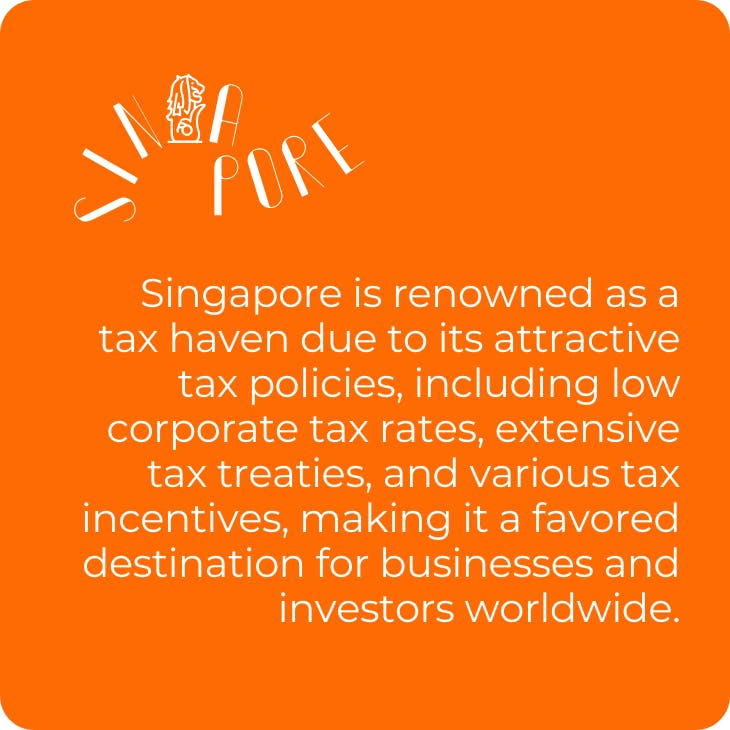Tax havens typically refer to jurisdictions or countries that offer favorable tax treatment to individuals and businesses. These locations often have low or zero tax rates on certain types of income, as well as lenient tax laws and regulations.
Using tax havens is legal if all regulations and reporting requirements are followed.
Tax havens benefit both high-net-worth individuals and corporations seeking to reduce tax liabilities.
Tax havens can lead to revenue loss for governments, increased inequality, and reduced public services. They may also lack transparency and distort the global economy.
Tax avoidance is legal and involves strategic planning to minimize taxes, while tax evasion is illegal and involves deceit to evade taxes.
No one enjoys being taxed as taxes affect income.
However, taxes are unavoidable, as many countries rely on revenue from taxes imposed on individuals and corporations.
Certain jurisdictions offer tax reliefs, tax incentives, tax benefits, and reduced tax rates to attract and retain foreign and local investment.
These jurisdictions are popularly referred to as tax havens.
Tax havens typically offer zero, single-digit, or low double-digit tax rates on corporate and individual income taxes.
If you're looking for ways to reduce your taxable income or profit, read on to find out the world's leading tax havens for businesses and individuals.
Are Tax Havens Legal?
You can reduce your tax burden by relocating to a country with favorable tax rates or setting up a subsidiary company in such jurisdictions.
It is completely legal to invest in any country globally, including tax havens as long as you comply with the legal requirements for investing in that territory.
Many tax havens often impose tax requirements on businesses and individuals.
You may still need to comply with any reporting requirements in your country of residence or in other countries where your company operates physically.
Therefore, it is advisable to engage professionals to ensure that you comply fully with all legal and tax requirements.
Who Can Benefit From Tax Havens?
Individuals and corporations can benefit from corporate tax havens.
Fortune 500 companies such as Nike, Goldman Sachs, and Apple use tax havens to reduce their tax liability significantly.
High net-worth individuals such as celebrities, athletes, and business tycoons also set up offshore assets in tax havens.
However, tax havens are not exclusively for the wealthy or multinational corporations.
Anyone can benefit from tax havens.
Many small businesses and individuals have realized the opportunities in tax havens and use tax havens to reduce their overall tax burdens
What Countries Are Tax Havens?
If you or your business can benefit from the tax cut, here are the top tax haven countries that are worth considering.
1. Hong Kong
Strategically located at the heart of Asia, Hong Kong is home to many global trading companies.
Hong Kong provides easy access to China, the manufacturing Hub of the world, making it easy for companies to import goods from China to Hong Kong.
Hong Kong is an important financial center with one of the best banking systems in the world.
You can operate a multi-currency bank account in Hong Kong and this has encouraged international trading activities in Hong Kong.
About 50,000 companies are incorporated in Hong Kong annually because of the ease of incorporating companies in Hong Kong.
You can incorporate a Hong Kong company or relocate your company to Hong Kong digitally without moving a muscle.
Hong Kong is also foreign investment-friendly.
A Hong Kong company can be wholly owned by foreigners.
Also, the company's directors do not need to be residents of Hong Kong.
While there are many benefits of doing business in Hong Kong, Hong Kong stands out as a tax haven because of its low corporate tax rate of 16.5%.
Corporate tax is also restricted to income derived from Hong Kong.
Hong Kong offshore companies pay zero income tax.
Individuals also have a lot to gain from the Hong Kong tax regime.
Income tax on individuals can be as low as 2% and is capped at 17%.
Taxes are not imposed on sales, interests, or dividends in Hong Kong.
Hong Kong is also a duty-free destination for trading companies.
Hong Kong imposes no import duties on most goods imported into the region.
There are few dutiable goods in Hong Kong such as hydrocarbon oil, tobacco, and alcohol.
Thus, if you're trading general goods in Hong Kong, you can maximize profit.
While there are countries with lower to zero tax rates, Hong Kong is still a great tax haven for companies and individuals because of its prominence for financial secrecy.
With no ties to the OECD, Hong Kong companies have no obligations to disclose any details of their Hong Kong investments.
Looking for a company secretary to make opening your Hong Kong business a breeze? Register with Air Corporate today and get a registered HK company in 48 hours.
2. Cayman Islands
The Cayman Islands is a British Overseas Territory with more companies than citizens.
Thousands of large corporations and small companies have set up subsidiaries on the Island due to its zero corporate tax rate and zero direct tax rates.
The Island is popularly referred to as a tax-neutral jurisdiction.
However, there are high duty rates imposed on goods and services.
Import duties range from 22 to 27% for most goods and a higher rate of up to 47% for luxury goods.
The high import taxes have made the island an expensive place to live.
The cost of operating a business on the Island is also on the high side.
Thus, while investors may benefit from the zero tax burden, trading companies may find it difficult to maximize profit.
Also, the Cayman Islands has elected to implement the Country-By-Country (CBC) reporting regulations as a fallout of its participation in the Multilateral Convention for Mutual Administration in Tax Matters.
As a result, companies resident in Cayman will be required to disclose tax details to other participating countries.
3. The Bahamas
The Bahamas is the holiday destination of choice.
It has some of the best views in the world and attracts thousands of tourists annually.
Its proximity to the United States also encourages investment in the Bahamas.
The Bahamas boasts of no corporate or personal income taxes and withholding taxes.
The Bahamas is also a vibrant financial center, hosting some of the biggest banks in the world like Goldman Sachs and JPMorgan Chase.
However, the country imposes import duties, value-added taxes, and license fees and may not be suitable for import-driven businesses.
4. Malta
Malta's proximity to Italy, the largest commercial hub for luxury goods in Europe, makes it a great location for European companies to set up offshore subsidiaries.
Though not a tax-free jurisdiction, the country encourages foreign investment with a low tax rate for foreign companies and several beneficial tax advantages for foreign and local companies.
Malta also promotes non-domiciled residency schemes for high-net-worth individuals which caps their income tax rate at 15%.
Malta may not be the ideal tax haven for small businesses and average-income earners but it's definitely considered a tax haven for large corporations and high-net-worth individuals.
However, due to its proximity to Europe, Malta is caught up with reporting obligations.
The Maltese tax code is also complex and one would need to engage an expert to fully enjoy tax benefits.
5. British Virgin Islands
The British Virgin Islands hosts over 400,000 companies which are over 1000% of its estimated population.
As a British Overseas Territory, the company attracts investments from British companies.
Taxes are not payable on offshore corporations, capital gains tax, and profits derived outside the Island.
Thus, it's an ideal location for setting up a holding company.
There's also no exchange control between an offshore company and offshore banking customers.
Investors in offshore companies can easily receive dividends and profit through their offshore bank accounts.
The Island is considered a tax haven because of its zero tax rate on interest, dividends, or corporate income.
However, businesses are liable to pay payroll taxes of 10% or 14% on income exceeding $10,000.

6. Singapore
Singapore offers a stable political environment and attractive tax policies and is considered one of the most tax-friendly jurisdictions in the world.
It boasts of a favorable corporate tax regime as it follows a territorial tax system, which implies that income generated outside the country is not liable to taxation.
Many Fortune 500 companies have set up subsidiaries in Singapore due to its tax-friendly economy.
Foreign capital can be held tax-free in Singapore and dividends are also not taxed in Singapore, making it easy for multinational companies and foreign investors to invest and repatriate profit.
Singapore tax haven also provides tax incentives for SMEs in some economic sectors that are deemed beneficial to the country's economy and business environment.
There are also other tax benefits such as tax exemptions for startups capped at 75% exemption on the first $100,000.
7. Luxembourg
Luxembourg is strategically positioned between France, Germany, and Belgium.
Although a small country, Luxembourg attracts lots of investment from foreigners and multinationals, including Fortune 500 companies.
Luxembourg established itself as a tax haven as early as the 1960s.
There are beneficial arrangements for companies to seek tax relief in Luxembourg.
Multinationals also establish special purpose vehicle companies in Luxembourg to invest in EU companies because of the favorable tax regime.
Luxembourg's location also makes it ideal for companies seeking to explore the European market.
The cost of living and business operations is unfortunately on the high side and may affect your bottom line in the long run.
8. Mauritius
Mauritius is a tax haven for most corporations seeking to extend their reach to Africa.
It is a small island with many offshore companies.
The income tax rate for individuals and companies is capped at 15%.
Individuals are not liable to pay any capital gains tax in Mauritius. Dividends are taxed at a minimal rate of 3%.
Companies are however required to pay capital gains tax and other duties and levies.
Mauritius is a tiny island that is somewhat isolated.
It takes a lot of time to move goods across the borders.
Thus, it may not be suitable for trading companies relying on imports or exports for profit.
What Are the Downsides of Tax Havens?
Tax havens can have several potential downsides, including:
- Revenue loss: Tax havens can lead to reduced tax revenue for governments, impacting their ability to fund public services.
- Inequality: The use of tax havens by wealthy individuals and corporations can exacerbate income and wealth inequality, raising concerns about fairness in the tax system.
- Erosion of public services: Reduced tax revenue can limit essential public services like healthcare, education, and infrastructure.
- Lack of transparency: Many tax havens lack transparency in their financial systems, making it difficult to track financial activities and potentially hindering efforts to combat illegal practices.
- Distortion of global economy: Tax competition driven by tax havens can lead to lower overall tax rates across countries, potentially impacting global economic stability and raising concerns about fairness in the tax landscape.
- Undermining tax compliance: Legal use of tax havens by individuals and businesses to minimize their tax burdens can potentially reduce tax compliance in countries with higher tax rates and stricter regulations.
What Is the Difference Between Tax Avoidance and Tax Evasion?
While both methods are used to reduce tax liabilities, they differ in legality and intent.
Tax Avoidance
Tax avoidance refers to the legal means by which individuals and businesses structure their financial affairs to minimize their tax obligations. It involves taking advantage of available tax incentives, deductions, and loopholes within the framework of tax laws. Tax avoidance strategies are considered legitimate and are often implemented with the assistance of tax professionals to ensure compliance with tax regulations. While tax avoidance may result in lower tax payments, it does not involve deceit, misrepresentation, or illegal activities.
Tax Evasion
On the other hand, this is the illegal practice of deliberately misrepresenting or concealing financial information to evade paying taxes owed to the government. It involves intentional efforts to underreport income, inflate deductions, hide financial assets, or engage in other fraudulent activities to avoid paying taxes. Tax evasion is a criminal offense punishable by law and can result in severe penalties, including fines, imprisonment, and civil liabilities.
What Is the Best Tax Haven?
Companies and individuals utilize tax havens to maximize profit and achieve financial stability.
While several jurisdictions may be considered modern corporate tax havens as a result of their investment-friendly tax rates and policies, factors such as the cost of business operations, proximity to resources, ease of foreign investment, and import and export duty rates may affect income expectations in the long run.
The best tax haven must enable investors to maximize profit.
Therefore, it is advisable to consult professionals on the peculiarities of your investment plans before you pick a tax haven.
If you've decided that Hong Kong is the best tax haven for you, you can register your business with Air Corporate today, and get a fully approved and operational business in 48 hours.
FAQs
The Financial Secrecy Index (FSI) is a tool created by the Tax Justice Network (TJN) to evaluate the degree of financial secrecy provided by different jurisdictions globally. It assesses the legal and regulatory structures, the availability of secrecy mechanisms, and the transparency and information exchange standards within each jurisdiction.
The United Kingdom is not generally considered a tax haven. While it has certain jurisdictions like the Isle of Man, Guernsey, and Jersey that offer favorable tax regimes, the UK itself is known for its relatively transparent tax system and compliance with international tax standards. However, perceptions may vary depending on specific tax policies and practices within different regions of the UK.
A traditional tax haven typically refers to a jurisdiction that offers favorable tax laws and regulations to individuals and businesses, allowing them to minimize their tax liabilities. These jurisdictions often have low or zero tax rates on certain types of income, such as interest, dividends, and capital gains.
Additionally, they may provide financial secrecy and confidentiality to protect the privacy of investors. Traditional tax havens are often characterized by a lack of transparency and cooperation with foreign tax authorities.
While tax breaks can stimulate economic activity and investment in specific sectors, their effectiveness in promoting overall economic growth depends on various factors, including the design of the tax incentives and the broader economic environment.
Different types of international agreements can be relevant to taxation, including:
- Double Taxation Avoidance Treaties (DTATs): Double taxation treaties aim to prevent double taxation of income earned in one country by residents of another country. They typically define the tax jurisdiction of each country and provide mechanisms for avoiding double taxation.
- Tax Information Exchange Agreements (TIEAs): TIEAs facilitate the exchange of information between countries to prevent tax evasion and ensure compliance with tax laws. They allow tax authorities to request and share information about taxpayers' financial activities.
- Tax provisions in other international agreements: While not strictly tax treaties, other agreements like Bilateral Investment Treaties (BITs) may contain provisions related to the taxation of investment income and capital gains.
- Multilateral Tax Treaties: These treaties involve more than two countries and aim to establish common rules and standards for taxation across multiple jurisdictions. Examples include tax treaties developed by organizations like the OECD (Organization for Economic Co-operation and Development) and the UN (United Nations), such as the Multilateral Convention to Implement Tax Treaty Measures to Prevent Base Erosion and Profit Shifting (BEPS MLC).
There are two main categories to take note of: income taxes and wealth transfer taxes.
Income Taxes
- Withholding tax: As mentioned previously, this is a tax withheld at the source of income, such as salaries, interest, or dividends.
- Income tax: This is a tax on the total income earned by an individual or entity during a specific period. It can be progressive (tax rate increases with income level) or flat (fixed tax rate).
- Corporate tax: This is a tax levied on the profits of corporations.
- Payroll tax: This is a tax levied on wages and salaries, often used to fund social security or other government programs.
Wealth Transfer Taxes
- Inheritance tax: This is a tax on the value of assets inherited from a deceased person.
- Estate tax: This is a tax on the total value of a deceased person's estate before it is distributed to beneficiaries.
- Gift tax: This is a wealth tax levied on the value of property or assets given as a gift by one person to another.
Here are some other taxes that might be considered related to these categories:
- Capital gains tax: As you mentioned, this is a tax on the profit earned from the sale of capital assets. While technically not an income tax, it's sometimes grouped with income taxes because it relates to the taxation of profits.
- Property tax: This is a tax levied on the value of real estate or other property owned by an individual or entity. It's not technically an income tax or wealth transfer tax, but it could be considered a tax on the ownership of assets.
- Luxury tax: This is a tax levied on certain high-value goods or services, often used to discourage their consumption or generate additional revenue.
It's important to remember that tax categories can vary depending on the specific jurisdiction. Consulting with a tax professional can help you understand the specific taxes applicable to your situation.





